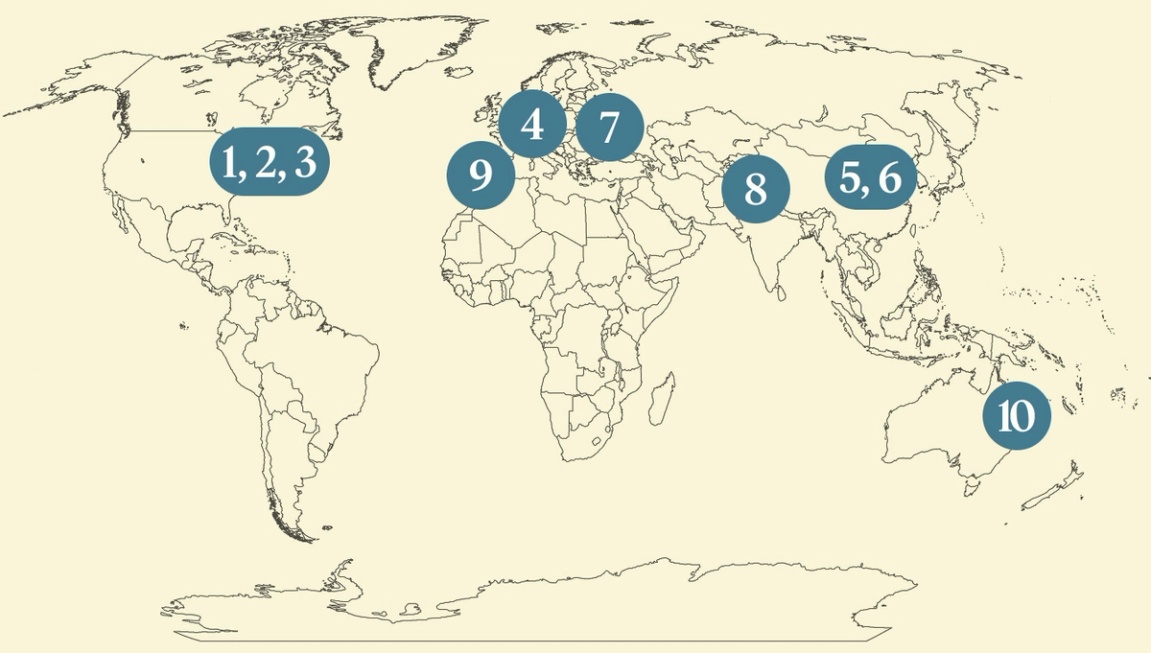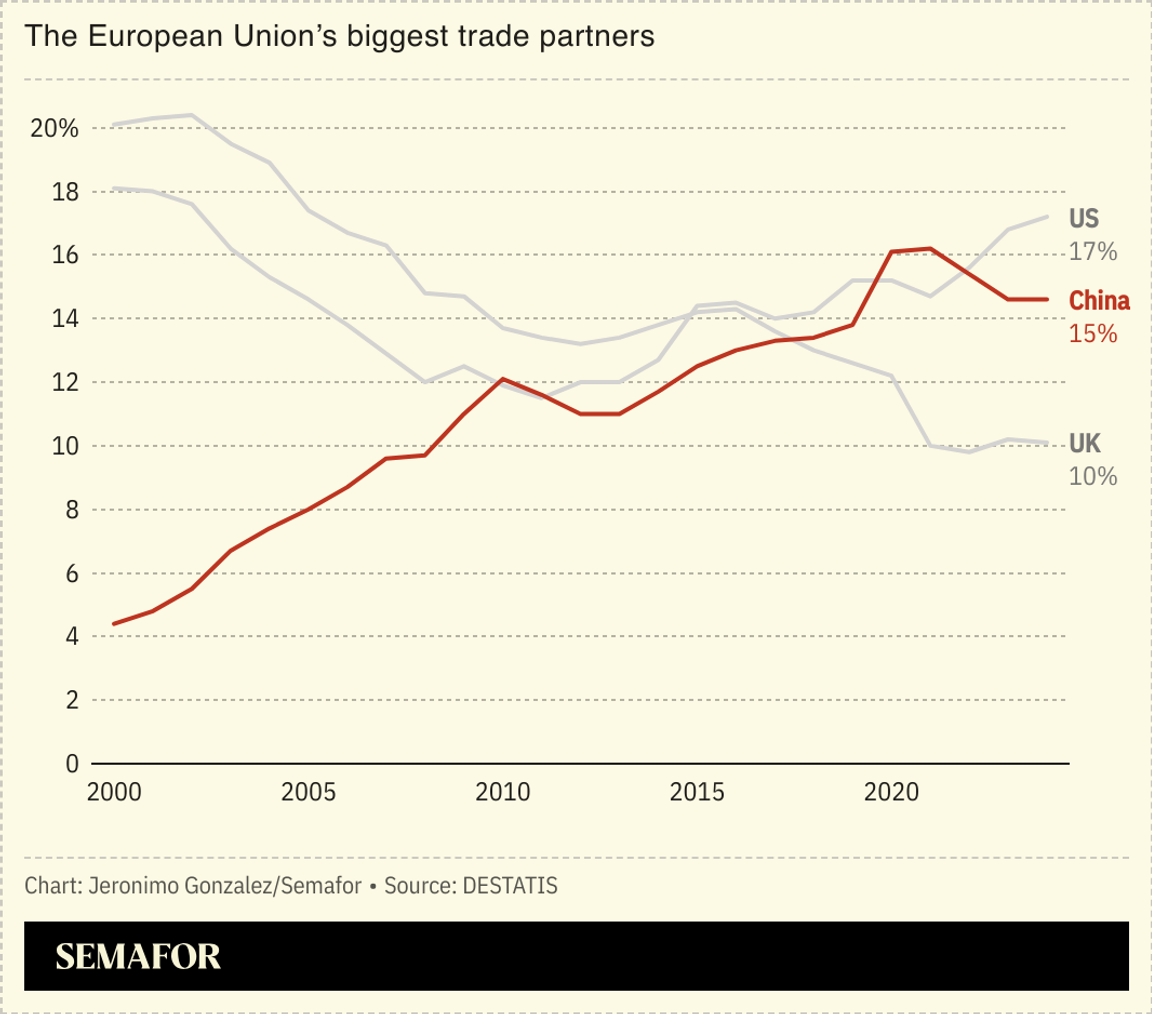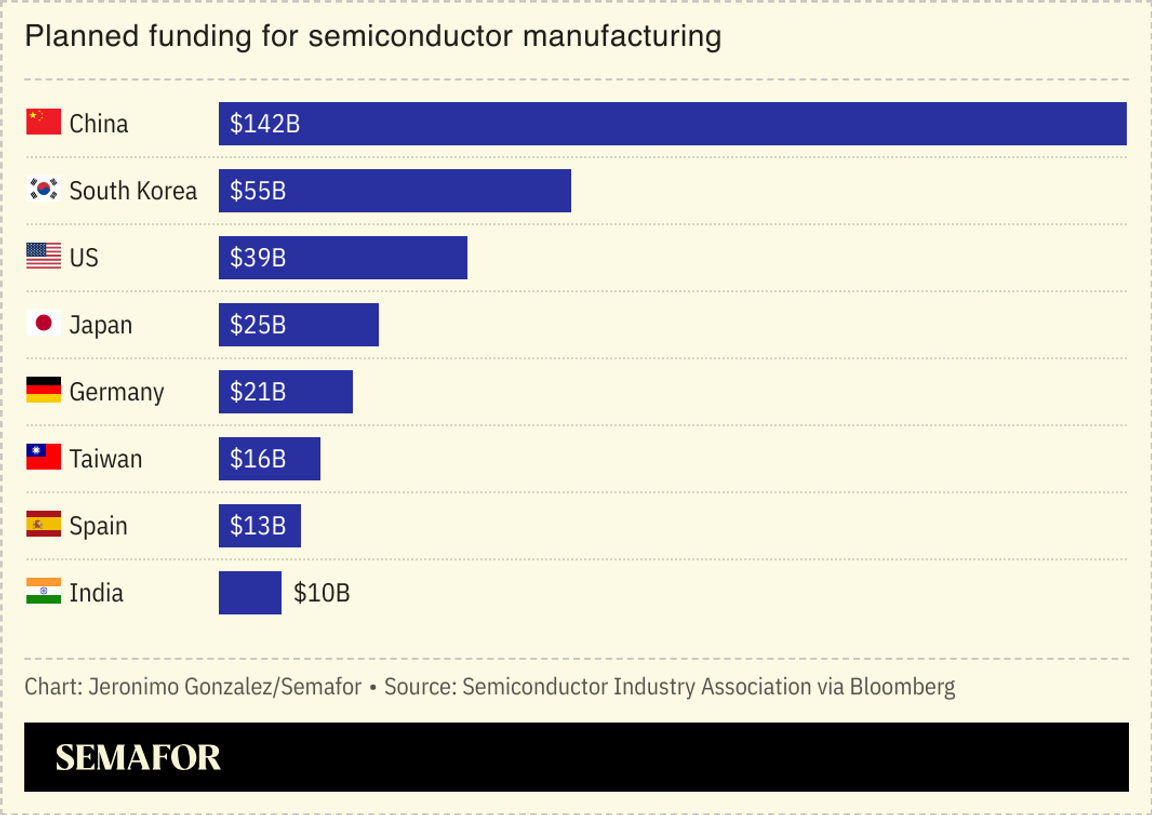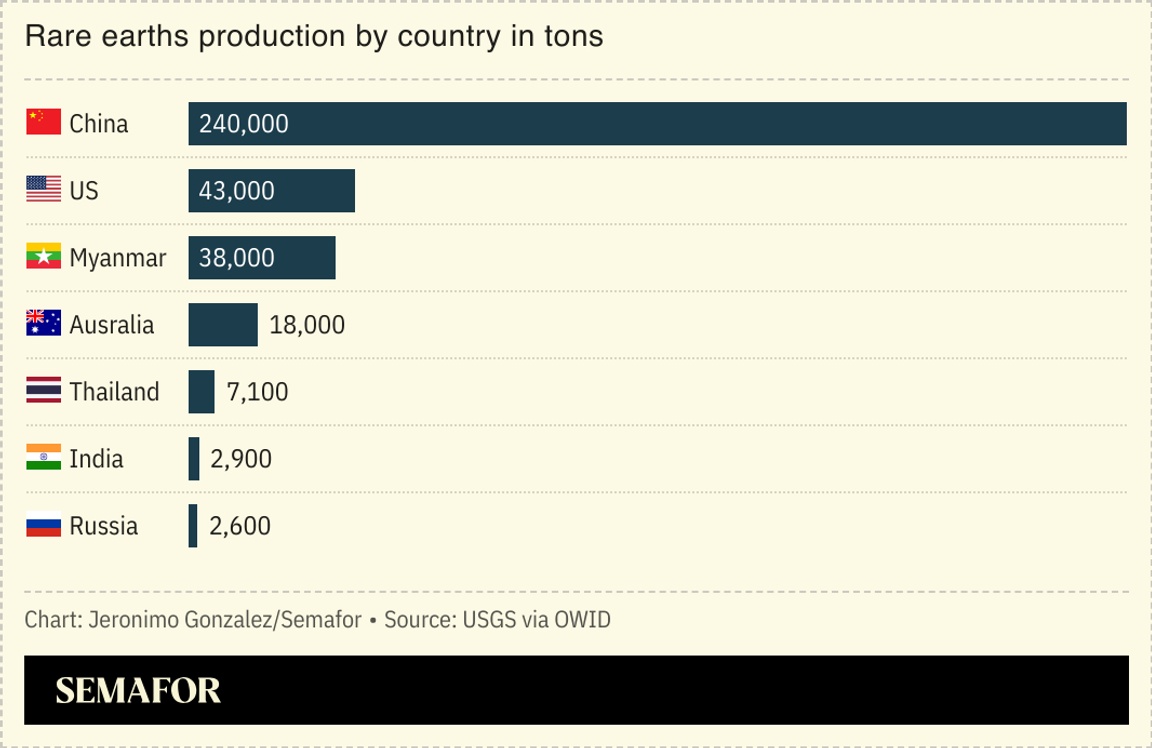| | CEOs voice anxiety over trade policy, Europe softens its tone, and the worst may be over for US-Chin͏ ͏ ͏ ͏ ͏ ͏ |
| |   Washington DC Washington DC |   Beijing Beijing |   New Delhi New Delhi |
 | Flagship |  |
| |
|
The World Today |  - CEOs anxious over Trump
- Europe softens trade tone
- US eyes China deescalation
- EU eyes China détente
- China domestic AI win
- Impact of rare-earth controls
- Kyiv, Washington clash
- India-Pakistan ties worsen
- Science journal carved out
- Worst coral bleaching
 William Shakespeare and Anne Hathaway may have had a happy marriage, after all. |
|
CEOs: Trade war hurts US brand |
  Ken Griffin. Shannon Finney/Getty Images for Semafor. Ken Griffin. Shannon Finney/Getty Images for Semafor.Global CEOs appeared increasingly anxious over US President Donald Trump’s unpredictable trade policy and the resulting market tumult. Speaking at the Semafor World Economy Summit, Citadel CEO Ken Griffin warned Trump’s actions “eroded” the country’s strong fiscal reputation — “It can be a lifetime to repair the damage that has been done,” the hedge fund boss said — while Neuberger Berman’s head said market volatility was pushing investors “further afield” to Europe and elsewhere. Their comments came after executives from major retailers privately told Trump that his trade policy would disrupt supply chains and increase prices. Trump softened his tone on China and the US Federal Reserve after that meeting, causing markets to rebound. |
|
Europe takes softer tone on trade |
  German Finance Minister Jörg Kukies. Shannon Finney/Getty Images for Semafor. German Finance Minister Jörg Kukies. Shannon Finney/Getty Images for Semafor.Top European officials voiced optimism over coming trade talks with the US. France’s finance minister said at Semafor’s World Economy Summit that the European Union was ready to make a deal “anytime,” calling for a “new partnership” between Brussels and Washington, while his German counterpart said a “sense of urgency” could drive negotiations. Britain’s finance chief, meanwhile, said the White House had indicated it was “keen” to cut a UK-US trade deal. Amid the anxiety, Europe also sees opportunity in the disruption to global trade: European Commission President Ursula von der Leyen recently said countries are “lining up to work with us,” while the bloc’s economy commissioner said at the World Economy Summit that Europe’s “stability and predictability” are advantages. |
|
US officials float China deescalation |
  Stephen Miran. Shannon Finney/Getty Images for Semafor. Stephen Miran. Shannon Finney/Getty Images for Semafor.US leaders voiced openness to improving ties with Beijing, while a senior analyst predicted that tensions between the world’s two biggest economies had peaked. “We’ve seen the worst in terms of escalation,” Bank of America’s top economist said at the Semafor World Economy Summit. US officials, meanwhile, floated a possible de-escalation in the trade war: “I’m optimistic that we will be able to take the temperature down a bit,” Stephen Miran, the chair of the White House Council of Economic Advisers, added, echoing remarks from the Treasury secretary and marking a shift in the administration’s posture after weeks of market turbulence and economic disruption. |
|
 Beijing neared a deal with Brussels to ease sanctions against European lawmakers, signaling an emerging détente between the EU and China, both of which face trade pressure from the US. Beijing hopes its decision to remove the restrictions will reopen talks over an investment pact that was torpedoed by the EU imposing sanctions on Chinese entities over alleged human rights violations in the Muslim-majority region of Xinjiang, the journalist Noah Barkin reported. The EU and China were at loggerheads just months ago but, faced with hefty tariffs from the US, have reportedly opened discussions on reducing electric vehicle tariffs and Beijing has pushed a charm offensive across the bloc, though that latter effort has so far been to little avail. |
|
China AI model made locally |
 A Chinese artificial intelligence firm said it trained a large language model comparable to industry-leading rivals entirely using domestically designed chips, underlining the pace at which China’s tech sector is slashing its dependence on the US. The announcement by iFlytek suggested Huawei had made significant progress in catching up to Nvidia, the American firm that dominates the market for the chips that power AI models, chips that Chinese tech companies are stockpiling, according to Nikkei, because they fear Washington will soon cut off shipments: The US has sought to progressively restrict China’s access to cutting-edge semiconductors in an effort to maintain a lead in AI development, and is considering imposing tariffs to drive growth in domestic chipmaking. |
|
Impact of rare-earth controls limited |
 China’s restrictions on rare-earth exports may not be as powerful a weapon in the trade war as Beijing hopes, experts said. “Heavy” rare-earth elements are important in batteries and other high-tech applications, and China processes “pretty much 100%” of them, an analyst told WIRED. After the US imposed high tariffs on Chinese goods, Beijing blocked their export. But the minerals are used in very small quantities in manufacturing, and often can be worked around: Earlier export controls did not significantly change prices. Companies which need them may be able to survive for the short term “on existing stockpiles,” said WIRED, “or even turn to recycled electronics to find them.” |
|
US, Ukraine clash over peace deal |
 Alina Smutko/File Photo/Reuters Alina Smutko/File Photo/ReutersUS and Ukrainian leaders clashed Wednesday over the terms of a possible peace agreement with Russia. US President Donald Trump lashed out at Ukraine’s Volodymyr Zelenskyy for refusing to accept a deal, and said Kyiv’s refusal to recognize Russia’s annexation of Crimea was “very harmful” to negotiations, while Vice President JD Vance said the US would “walk away” from the talks unless a deal was reached. Zelenskyy, meanwhile, has ruled out such concessions, and complained that even as he has called for a ceasefire, Moscow has hammered Ukrainian cities. “There is an old Russian saying that ‘nothing is agreed until everything is agreed,’” the BBC’s diplomatic correspondent wrote. “Right now we seem far away from that.” |
|
 Business as usual no longer works — today’s challenges are moving too fast. AI is redrawing entire industries. Economic volatility is rising, and long-established trade patterns are fracturing. To make sense of this moment, we convened some of the world’s sharpest minds to create The Semafor View — a new annual guide for navigating global uncertainty. This year’s edition breaks down the businesses, policies, and technologies reshaping the global economy. |
|
India downgrades Pakistan ties |
 Sanna Irshad Mattoo/Reuters Sanna Irshad Mattoo/ReutersNew Delhi downgraded its ties with Islamabad after gunmen killed 26 people at a resort in Indian-held Kashmir. India — which has long accused Pakistan of aiding militants — closed a border crossing, canceled a visa-free travel program, and suspended a water-sharing treaty that has survived two wars. Ties between the two — which both claim Kashmir, and have fought multiple wars over prior decades — were already rocky before the attack. India had justified asserting tighter control over Kashmir by saying it was keeping militants in check. “The whole idea… behind this attack was to sort of puncture that narrative that, you know, everything is fine,” a former Indian army general told The New York Times. |
|
|